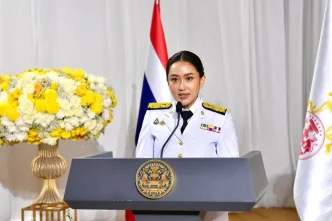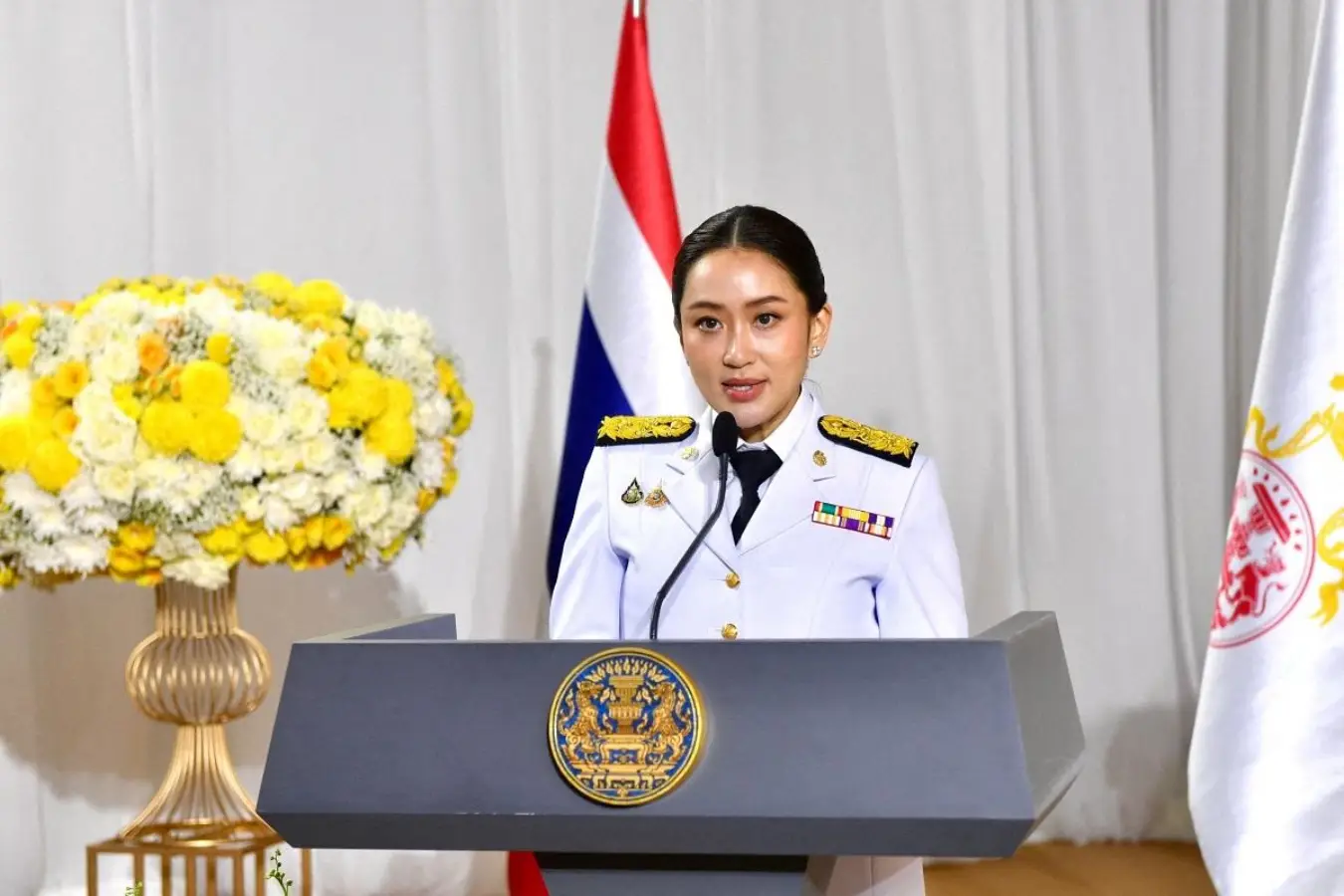Thailand’s Prime Minister Paetongtarn Shinawatra has sought to quell mounting speculation over a potential Cabinet reshuffle, asserting her authority in decision-making amid comments from her influential father, Thaksin Shinawatra, and navigating delicate coalition dynamics. Speaking at a press conference alongside Indonesian President Prabowo Subianto at the Government House in Bangkok on May 19, 2025, Paetongtarn addressed concerns over the performance of key ministries and the stability of her administration.
Reshuffle Rumors and Thaksin’s Influence
At the heart of recent political discourse in Thailand is the question of a Cabinet reshuffle, fueled by Thaksin Shinawatra’s suggestion that the Interior Ministry should remain under the control of the Pheu Thai Party, which Paetongtarn leads. Thaksin, a former prime minister and a towering figure in Thai politics, has often been seen as a guiding force behind the party, raising questions about the extent of his influence over the current government. Responding to these speculations, Paetongtarn was clear in asserting her autonomy, stating that any decision on a reshuffle would be hers alone. “It is for me to decide whether a reshuffle is necessary” she told reporters, emphasizing her desire to prevent ministers from feeling unsettled by the swirling narratives.
When pressed on whether the Interior Ministry’s performance over the past two years has been lacking—an implication stemming from Thaksin’s remarks—Paetongtarn distanced herself from her father’s views. “Thaksin’s comments were his personal opinion, and I have yet to make such an assessment” she said. She also defended Interior Minister Anutin Charnvirakul, noting that communication with him has been consistently responsive and accessible. Acknowledging the inherent challenges faced by all ministries, she added that each department operates within certain limitations on what can be achieved.
The prime minister’s comments come against a backdrop of persistent rumors about Thaksin’s behind-the-scenes role in shaping government policy. Addressing claims of undue influence, Paetongtarn dismissed the notion that her father controls the administration. “How exactly is this control? In reality, those affected by his words are not just within Pheu Thai. Even people outside of politics feel impacted. Does that mean he exerts control over others?” she questioned. She further elaborated that influence is a matter of individual perception, asserting, “I don’t think control is possible. It depends on whether we allow it—not just with Thaksin, but with anyone.”
In a direct rebuttal to concerns about a return to the oft-cited dynamic of “Thaksin thinks, Pheu Thai acts,” Paetongtarn offered reassurance. “Thaksin offers advice, and his daughter takes it into consideration” she said, framing their relationship as one of familial counsel rather than political dominance. Her remarks aim to strike a balance between acknowledging her father’s stature and asserting her own leadership, a delicate task given Thaksin’s polarizing legacy in Thai politics.
Coalition Dynamics and Policy Challenges
Beyond the reshuffle speculation, Paetongtarn’s administration faces the challenge of maintaining cohesion within a coalition government comprising multiple parties with diverging interests. One point of contention has been the Bhumjaithai Party’s stance on the digital wallet cash handout scheme, a flagship policy aimed at stimulating economic activity through direct payments to citizens. When asked about suggestions from Bhumjaithai to increase the payout amount to 20,000 Thai Baht (US$560), Paetongtarn acknowledged the proposal but highlighted practical constraints. “It is not entirely contradictory. They are suggesting an increase, but in reality, the budget is insufficient, and other priorities must be addressed first” she explained.
The digital wallet initiative has been a cornerstone of Pheu Thai’s economic agenda, designed to inject liquidity into the economy by providing cash handouts to eligible citizens. However, budgetary limitations and competing priorities—such as infrastructure development and social welfare programs—have complicated its rollout. Paetongtarn’s response suggests a pragmatic approach, balancing populist promises with fiscal realities. While the exact amount and timeline for the handouts remain under discussion, the prime minister’s comments indicate that coalition partners will need to align on a feasible plan to avoid public discontent.
Despite these policy disagreements, Paetongtarn was quick to affirm the strength of her administration. “The government remains strong, just as it was on its first day of establishment” she declared, signaling confidence in her ability to manage coalition tensions. Her optimism was further bolstered by the recent passage of the budget bill in its first reading, securing 322 votes in favor, 158 against, and two abstentions. Expressing gratitude for the support, Paetongtarn noted that the approval would enable the government to continue working for the people and fully implement planned policies.
Navigating Thailand’s Political Landscape
Paetongtarn Shinawatra’s tenure as prime minister, which began in 2024, has been marked by the dual challenge of establishing her own political identity while managing the legacy of her family’s long-standing influence in Thai politics. As the daughter of Thaksin Shinawatra, who was ousted in a 2006 military coup, and the niece of Yingluck Shinawatra, another former prime minister forced into exile in 2014, Paetongtarn carries the weight of the Shinawatra name—a symbol of both populist appeal and deep political division. Her leadership of the Pheu Thai Party, which has historically championed policies favoring rural and working-class voters, places her at the forefront of Thailand’s ongoing struggle between democratic aspirations and entrenched power structures.
The speculation over a Cabinet reshuffle is not merely a matter of personnel changes but a reflection of broader power dynamics within the coalition government. The Interior Ministry, which oversees local administration and plays a critical role in national security and disaster response, is a coveted portfolio. Thaksin’s suggestion that it remain under Pheu Thai control has raised eyebrows among coalition partners, particularly Bhumjaithai, which currently holds the position through Anutin Charnvirakul. While Paetongtarn has refrained from endorsing her father’s view, her acknowledgment that “everything is possible” regarding a future reshuffle—echoing her election campaign rhetoric—keeps the door open for potential changes.
Analysts suggest that any reshuffle would need to carefully balance the interests of coalition partners to avoid fracturing the government. The Pheu Thai Party, while dominant, relies on the support of smaller parties like Bhumjaithai to maintain a parliamentary majority. Alienating key allies over ministerial appointments could jeopardize legislative priorities, including the budget bill’s subsequent readings and the digital wallet scheme’s implementation. At the same time, Paetongtarn must contend with public perceptions of her independence, as lingering narratives of Thaksin’s influence risk undermining her credibility as a leader in her own right.
Economic Pressures and Public Expectations
Thailand’s political stability is closely tied to its economic performance, and Paetongtarn’s administration faces significant pressure to deliver on promises of growth and welfare. The digital wallet initiative, while popular in concept, has encountered logistical and financial hurdles, with debates over the payout amount highlighting the government’s constrained fiscal space. An increase to 20,000 Thai Baht (US$560) per recipient, as suggested by Bhumjaithai, would require substantial funding—potentially at the expense of other critical areas such as healthcare or education. Paetongtarn’s measured response to the proposal reflects an awareness of these trade-offs, though it remains to be seen whether the government can strike a balance that satisfies both coalition partners and the public.
Beyond immediate policy challenges, Thailand grapples with structural economic issues, including income inequality, an aging population, and reliance on tourism—a sector still recovering from the impacts of the COVID-19 pandemic. The Pheu Thai Party has historically positioned itself as a champion of economic redistribution, and Paetongtarn’s ability to deliver tangible benefits to ordinary Thais will be a key test of her leadership. Failure to do so could embolden opposition parties or fuel public discontent, particularly in rural areas where Pheu Thai has traditionally drawn strong support.
Looking Ahead
As Paetongtarn Shinawatra navigates the complexities of coalition politics and familial legacy, her administration stands at a critical juncture. The speculation over a Cabinet reshuffle, while currently unresolved, underscores the delicate balance of power within Thailand’s government and the enduring influence of figures like Thaksin Shinawatra. Whether Paetongtarn can carve out a distinct leadership style—independent of her father’s shadow while maintaining coalition unity—remains an open question.
For now, the prime minister appears focused on projecting stability and progress, buoyed by the budget bill’s initial success and her commitment to policy implementation. Yet, with economic challenges looming and public expectations high, the coming months will test her ability to translate promises into results. As Thailand watches closely, Paetongtarn’s decisions on reshuffles, digital handouts, and coalition management will shape not only her political future but also the trajectory of a nation long defined by cycles of change and continuity.















